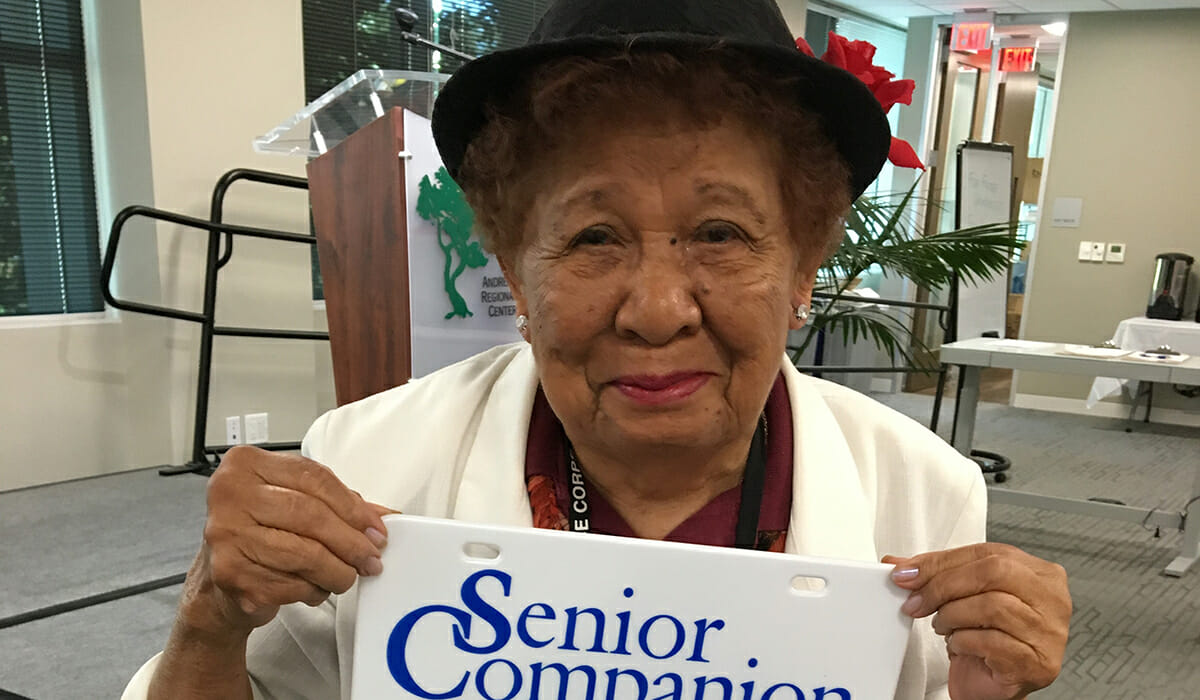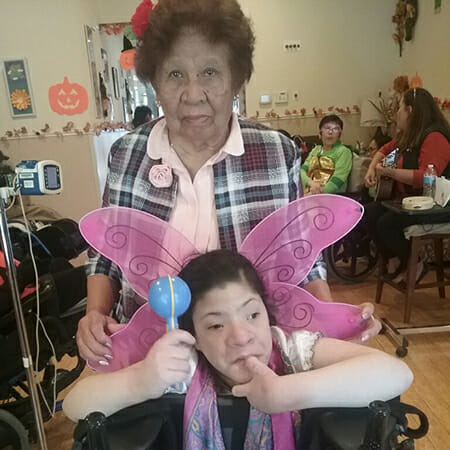Volunteer Grandma Helps Take Care of Woman with Developmental Disabilities

Meet Daily Point of Light Award honoree Rosita Nicolas. Read her story and nominate an outstanding volunteer or family as a Daily Point of Light.
For the past nine years, Rosita Nicolas has been dedicating her time to serving adults with development disabilities. Five days a week, for several hours a day, she volunteers at the San Andreas Regional Center in San Jose, Calif. The 86-year-old is one of the only volunteers to serve in two different capacities, serving both at a vocational workshop where she helps individuals with developmental disabilities learn skills to improve their independence, as well as in the Senior Companion Program.
As part of the program, Rosita is paired with a young woman named Yvonne with developmental disabilities and special health needs, who at the time of entering the program had recently lost both of her parents. Rosita has stepped in to be a grandmother of sorts to Yvonne — talking to her, singing to her, painting her nails, doing her hair, and spending every birthday with her, even if it falls outside of her regular volunteer days. Rosita goes above and beyond as both a volunteer for the San Andreas Regional Center and as a companion to Yvonne, always bringing a smile to the young woman’s face.
Describe your volunteer role with the Senior Companion Program.
I really like the Companion Program very much. I’m so happy to help the client. Some people, they are expecting that you can’t help. I don’t believe that. I tell myself that even though the client cannot talk or what not, they respond to you when you say something they like, so I am so happy from that.
The client cannot talk, cannot stand, [they’re] in the wheelchair. The name of the client is Yvonne. She doesn’t know anything, so I try my best to talk to her and she can understand me. The longer the time that I work with her, [there is more] improvement. When I sing to her, she smiles. When I see her in the morning, I say “Good morning Yvonne, how are you?,” and her two hands grab very hard, she smiles, and her head is turning back and forth. That’s the answer of “how are you” and “good morning.” I am happy with that. Everyday I do that, the same, so it’s easy for her to understand. If she doesn’t know [how to respond] yet and I change the subject, she’s not going to learn something, so I change the subject when she knows already the subject that [I spoke to her about] the first time. That’s my idea for her. I like to help her.

What else do you do with Yvonne?
When I got there, Yvonne had no more relatives. The ones who adopted her already passed away, both of them. That’s why they needed a volunteer grandma. … They chose me, they put me [with Yvonne]. I’m now the one to handle Yvonne. I treat her like my little granddaughter. I do everything so that she learns something. I really care for her every morning. I read the same story to her, so she can [understand it]. I don’t change it. When I get there in the morning and I say “Good morning, Yvonne, how are you?” then she responds. I grab her hand and [she] smiles. Then after that, if [the nurse] doesn’t comb her hair, I fix it. She’s a little girl so I have to put in barrettes, something like that, to look good. Then after, I keep talking to her, any joke or saying, something like that.
Why did you want to start volunteering with this program?
I am a Legion of Mary [association of Catholics who serve the Church on a volunteer basis] and we have to make a mission to help anybody. That’s our job. … I put my application in and then they hired me. When I got to [the program], I said, “Oh my God, this is what I am looking for.” That’s why I’m happy. … I liked to read to her [to help Yvonne] improve, because if you teach them something and they respond to you, wouldn’t that make you happy? I like to help them.
Do you have any memories with Yvonne that stick out to you?
One time, she got sick in the hospital. The supervisor said, “Grandma, do you want to visit Yvonne in the hospital?” I said yes, so we went to the hospital. When I went there, she was really sleepy. Then I said, “Yvonne, I’m here, Grandma,” and she just opened only her eyes. Then I sang to her. She raised her hand high and she wanted to hold me. I cried, because she remembered the things that I say to her and sing to her. The nurse said, “Grandma, she remembers you,” and I said “Yes.” They’re lonely. I cried. I cried very much. I can’t sit with her because of everything happening right now [with COVID-19 restrictions], so I miss her already.
How are these adults helped by having someone like you spending time with them?
When I went there, [the caretakers] were so surprised because Yvonne was learning something. They said “Oh, Grandma, you’re good, look, Yvonne has improved.” Then one of the nurses come over and said “Grandma, let me see what Yvonne learned from you,” and I said “Ok, good morning Yvonne.” I raise my hand, and then her hand also was shaking. They brought in the walker and she was standing and I went forward. I said, “Yvonne, come here, follow me, come on,” and she came to me. They were like, “Wow, Grandma, she learned and she likes you.” That’s the improvement that I do for Yvonne.
What’s been the most rewarding part of your work?
I’m really happy to help somebody. That’s what I want, to help somebody improve a little bit. Plus, it helps me, also. I’m 86 years old, just in the house doing nothing, so it’s easy. It’s nice for me to get up in the morning, dress up, and then go out. Then when you get there, you meet some other people and talk to them. It’s helped myself also by not staying in the house and watching TV. Volunteering is good for me, also, and my body.
What do you want people to learn from your story?
What I can say is don’t judge the client who you see is not talking or cannot do anything. Don’t judge them for not improving anymore. For me, there is a little improvement. If you’re going to say “Hi, Yvonne,” and she looks at you and smiles, that’s already improvement, right? … Don’t judge that [the adults with developmental disabilities] cannot do anything. They can do something. It just might not be too much. As long as they are alive, they can respond, but in a different way. That’s what I can tell the others.
Do you want to make a difference in your community like Rosita? Find local volunteer opportunities.
